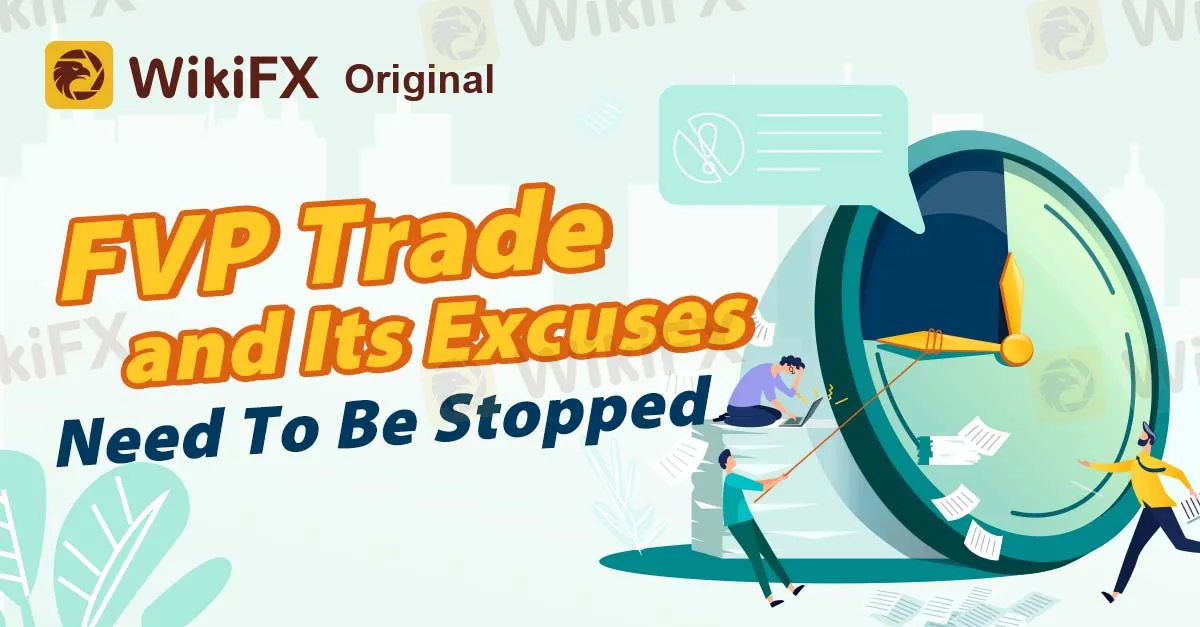简体中文
繁體中文
English
Pусский
日本語
ภาษาไทย
Tiếng Việt
Bahasa Indonesia
Español
हिन्दी
Filippiiniläinen
Français
Deutsch
Português
Türkçe
한국어
العربية
FVP Trade and Its Excuses Need To Be Stopped
Abstract:FVP Trade is a forex broker established in 2017. Being an unregulated forex broker that is operating without any valid licenses nor recognized regulatory status, FVP Trade is allegedly a Ponzi scheme in disguise.

Recently, it has been reported that FVP Trade's scheme has come to an official end. The amount of complaints received by WikiFX's customer support team regarding FVP Trade freezing clients' accounts has been overwhelming.
On July 18th, the management team of FVP Trade released the statement below:

In conjunction with this announcement is the frustration and fear of all FVP Trade's clients.
It is believed that FVP Trade is using the collapse of Luna as an excuse for its scheme. Although it tried to sound convincing, the reality is far from the truth because the timeline does not match. Here is why:

Above is a technical price chart of Luna with the important dates marked.
The main question is: why is FVP Trade blaming Luna after 2 months of its crash?
FVP Trade claims that Luna's crash is the main reason behind its much-needed “upgraded” which then put its clients' accounts at risk due to money laundering activities during this process.
Although FVP Trade explains that they have engaged with U.K. authorities, no official names or legal announcements have been made to this day. Its users have been left clueless with no further explanations or legal evidence to prove that their funds are still in good hands.

Moreover, FVP Trade did not provide a solid date for the restoration of its system despite the havoc it had caused. Unfortunately, it is highly probable that FVP Trade is closing this case with an official “goodbye”, but without a “see you later”.
To date, the total sum of losses suffered by FVP Trade's clients remains uncleared.
Through this incident, WikiFX would like to remind our users to always conduct thorough research before engaging with any forex broker.

Disclaimer:
The views in this article only represent the author's personal views, and do not constitute investment advice on this platform. This platform does not guarantee the accuracy, completeness and timeliness of the information in the article, and will not be liable for any loss caused by the use of or reliance on the information in the article.
Read more

Top 4 Alarming Signs When Trading Through London Capital Group
Planning to invest in London Capital Group? Take a pause, read this exposure story, and then make a decision whether it's worth your investment.

Know These 5 Truths- Before You Choose Blackwell Global
You will find many articles appreciating Blackwell Global, but only a few talk about the red flags of the broker. In this article, we will expose the broker and discuss the harsh truths about Blackwell Global. Keep reading.

5 Reasons to Know Why INFINOX Is a Standout Broker?
Every trader wants to invest their hard-earned money with a broker that offers them benefits and makes their forex journey smooth. Here is a broker you can consider to make your forex trading experience easier. Check out this article to learn how INFINOX stands out in the field of forex brokers

Real Risk Factors with Admiral Markets ! Explained
Many people like Admiral Markets for various reasons, but they often ignore its red flags. Before investing with any broker, it's important to understand the risks involved. If you're not careful, you could fall victim to a scam. Be Scam Alert and make sure you know the risks before choosing Admiral Markets.
WikiFX Broker
Latest News
Alchemy Markets: A Closer Look at Its Licenses
Wondering Why Your International Earnings Come Less Than Expected? It's Because of Forex Markup Fees
FCA to modernise rules to unlock investment
How Fake News Sites Are Fueling a Global Investment Scam Epidemic
From Novice to Pro: Why Investors Trust Land Prime?
10-year Treasury yield ticks lower after core CPI comes in slightly lightly lower than expected
Asia-Pacific markets mixed after Trump's tariffs on Indonesia
Labubu craze to drive up profit 350%, China\s Pop Mart says
PrimeXBT Launches MT5 PRO Account for Active Traders
Central banks are increasingly buying gold from local mines as prices surge
Currency Calculator


